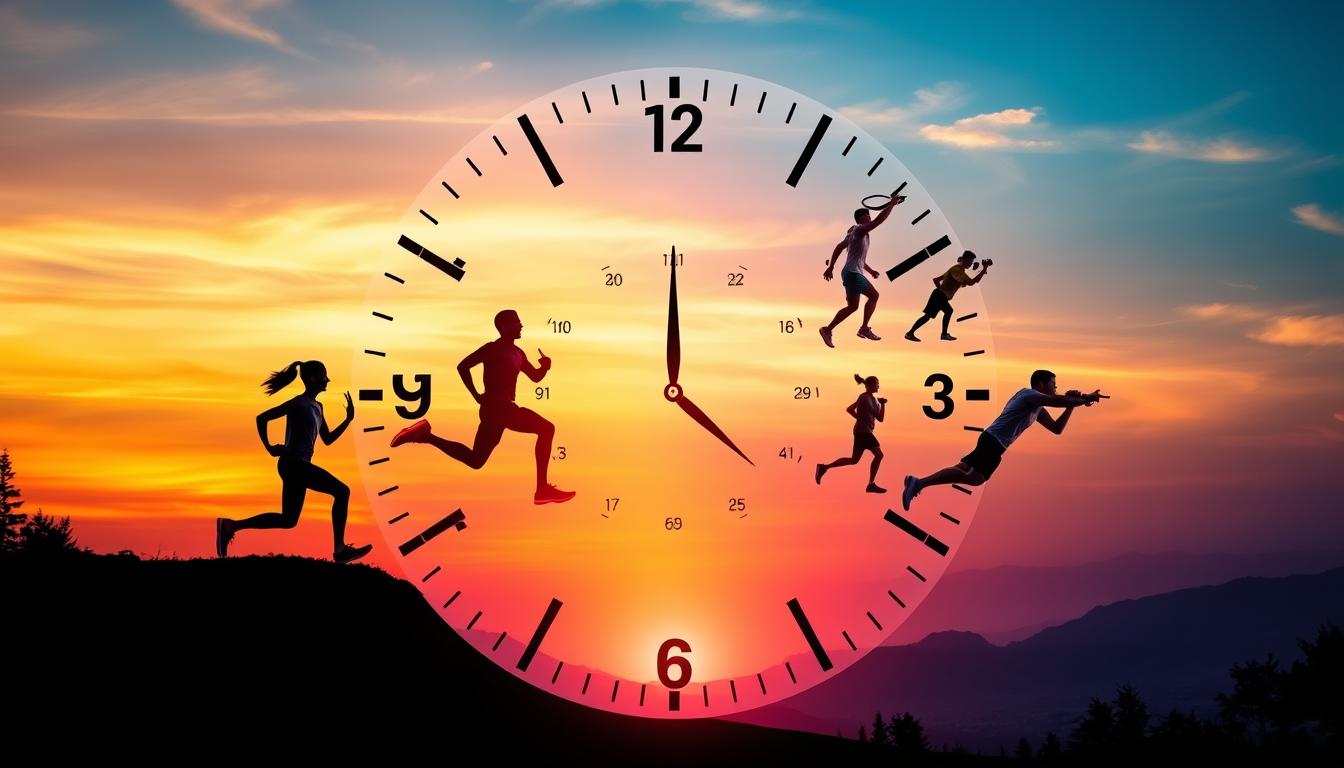Learning about the link between my circadian rhythm and sports has changed my game. My body’s internal clock affects my strength and mind. Knowing how sleep cycles boost my energy lets me plan better training and rest.
This insight helps me improve my sports skills. It lets me reach my goals more easily.
Understanding Circadian Rhythms
Circadian rhythms control our body’s functions in 24-hour cycles. They are guided by an internal clock in the hypothalamus. This clock manages sleep, hormone release, and metabolism, all key to our daily lives.
What Are Circadian Rhythms?
Circadian rhythms are our body’s internal cycles that repeat every 24 hours. They affect our physical and mental states, like mood and alertness. Our internal clock ensures our body works best, influenced by light and daily habits.
How Circadian Rhythms Affect Daily Life
Circadian rhythms greatly impact our daily lives. They decide when we’re energetic or tired. For example, I’m most productive at certain times, matching my body’s natural highs.
Knowing these rhythms helps me plan better. I schedule activities like exercise and work to match these natural cycles. This improves my performance and well-being.

| Aspect | Impact |
|---|---|
| Energy Levels | Varies throughout the day; peaks usually in the morning and late afternoon |
| Mood | Can fluctuate; often better in alignment with natural rhythms |
| Alertness | Highest during certain daytime hours |
| Hormonal Release | Regulates essential hormones such as cortisol and melatonin |
The Science Behind Circadian Rhythm and Athletic Performance
Learning about the link between sleep and sports shows how to get better. Good sleep helps with physical and mental recovery. Both are key for doing well in sports.
The Influence of Sleep Cycles on Performance
Studies in Sleep show sleep quality and length impact sports performance. Deep sleep fixes muscles and builds proteins, vital for recovery. Bad sleep can slow down and mess up my game.
Biological Clocks and their Role in Recovery
My body clock controls hormones like cortisol and melatonin, affecting recovery. Cortisol helps with stress, and melatonin helps sleep. When hormones are right, my body recovers better, improving my sports skills.

| Sleep Cycle Stage | Duration | Benefits for Athletes |
|---|---|---|
| Awake | 0-20 minutes | Transitioning to sleep; preparation for recovery. |
| Light Sleep | 20-40 minutes | Initial muscle relaxation; reduced heart rate. |
| Deep Sleep | 40-90 minutes | Muscle recovery; protein synthesis; hormone regulation. |
| REM Sleep | 90-120 minutes | Cognitive functioning; memory consolidation; emotional balance. |
Optimizing My Training Schedule
Creating a training schedule that fits my natural rhythms boosts my performance. I notice when I’m most energetic to get the most from my workouts. I listen to my body and track my progress to refine my routine.
Identifying My Peak Performance Times
To optimize my training schedule, I study my daily energy levels. This helps me find my best workout times. I’ve noticed:
- Morning hours give me a motivation boost.
- A mid-afternoon slump can lower my energy.
- Evening workouts can be invigorating but might hurt my sleep.
By monitoring my performance for weeks, I pinpoint these times. This personal touch has made my workouts more effective.
Scheduling Workouts Around My Circadian Rhythm
After finding my peak performance times, I plan my workouts around them. I save intense sessions for when I’m most energetic. My schedule looks like this:
| Time of Day | Activity | Focus |
|---|---|---|
| 6:00 AM – 7:00 AM | Cardio Session | Endurance |
| 12:00 PM – 1:00 PM | Strength Training | Power |
| 5:00 PM – 6:00 PM | Flexibility & Recovery | Restoration |
By scheduling my workouts this way, I reach my peak performance. This makes every workout count.
Nutrition and Circadian Rhythms
The connection between nutrition and circadian rhythms is fascinating. It’s especially important for improving athletic performance. Research shows that eating at the right times can boost energy and aid in recovery.
Understanding how my body’s rhythms affect my metabolism is key. I plan my meals to match my body’s needs. For example, I eat carbs before workouts to fuel my body. This helps me perform better and recover faster.
Here are some tips that work for me:
- Plan meals based on activity levels; eat complex carbs before workouts for energy.
- Incorporate protein-rich foods post-exercise to boost muscle recovery.
- Stay consistent with meal timing to help regulate appetite and energy peaks.
- Hydrate adequately throughout the day to support overall performance.
By focusing on nutrition timing, I’ve seen my performance improve. It helps me stay energized and recover well. This makes my training more effective.

Tips for Better Sleep Hygiene
Improving my sleep hygiene can really boost my athletic performance. By making my sleep area cozy and sticking to a sleep schedule, I create the perfect setting for rest. This helps me recover better.
Creating a Restful Environment
To get a good night’s sleep, I need a sleep-friendly space. A good sleep area has a few key things:
- Reducing noise levels: White noise machines or earplugs help block out loud sounds.
- Minimizing light exposure: Blackout curtains keep the room dark, helping me sleep deeper.
- Maintaining a comfortable temperature: A cool room makes for better sleep.
- Removing distractions: Keeping electronics away helps me focus on sleep and avoid interruptions.
Establishing a Consistent Sleep Schedule
Sticking to a sleep schedule helps my body’s natural rhythm. I try to go to bed and wake up at the same times every day. The Sleep Foundation suggests these tips:
- Set a regular bedtime: It tells my body when it’s time to sleep.
- Avoid screens at least an hour before bed: Less blue light helps my sleep cycle.
- Incorporate relaxing bedtime routines: Reading or gentle stretching makes me sleepy.
These steps not only improve my sleep but also help me perform better in sports. A well-rested body is stronger and more ready for challenges.
Circadian Rhythm Disruptions in Athletes
As an athlete, I’ve learned that my performance is closely tied to my circadian rhythm. But, disruptions can happen, especially from traveling and stress. It’s important to understand these disruptions to improve my training and recovery.
Traveling and External Factors
Traveling can really mess with my circadian rhythm, especially when I cross time zones. This is called jet lag and makes me tired and unfocused. To deal with it, I adjust my sleep schedule before traveling and stay hydrated. This helps keep my performance up.
The Impact of Stress on My Circadian Cycle
Stress can really affect my sleep. As an athlete, I often feel a lot of pressure, which can make me anxious and disrupt my sleep. To keep my rhythm stable, I use relaxation techniques like deep breathing and meditation. This helps me recover better and perform better in sports.

